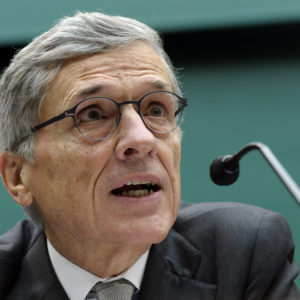The Federal Communications Commission doubled down on its claim AT&T’s data-free streaming of DirecTV content violates net neutrality, according to a report released Wednesday.
Wednesday’s report by the agency’s Wireless Bureau follows up on letters between the bureau and AT&T that drew similar conclusions about AT&T zero-rating DirecTV content for subscribers, while still charging customers for streaming competitors like Netflix and Hulu.
DirecTV Now‘s $35 per month price with unlimited mobile streaming for AT&T customers amounts to price discrimination, according to the FCC. The agency said the low price makes it infeasible for competitors to pay AT&T to sponsor their own data on its network, violating the general conduct standard of the 2015 Open Internet Order.
The report “expresses no concern with retail zero-rating per se,” but concludes the price AT&T charges DirecTV competitors to sponsor data is higher than the cost imposed on itself by exempting data from DirecTV, which it owns. The bureau came to a similar conclusion about Verizon’s FreeBee zero-rating program, but not T-Mobile’s Binge On.
“In light of the rates at which DIRECTV is offering its DIRECTV Now service to end users, the information we have indicates that AT&T (including both the network operator and edge provider affiliates) does not consider zero-rating to be a real cost of business,” the report reads. “Instead, AT&T appears to view the network cost of Sponsored Data for DIRECTV Now as effectively de minimis.”
While T-Mobile charges all edge providers the same rate to exempt their data from data caps as part of Binge On, “AT&T imposes hefty per-gigabyte charges on unaffiliated third parties for use of Sponsored Data,” the report goes on. “All indications are that AT&T’s charges far exceed the costs AT&T incurs in providing the sponsored data service. Thus, it would appear that AT&T’s practices inflict significant unreasonable disadvantages on edge providers and unreasonably interfere with their ability to compete against AT&T’s affiliate, in violation of the General Conduct Rule.”
AT&T argues it incurs a real cost from the program as a result of sustaining and growing its network to keep up with more data downloads by subscribers as a result of the program. The carrier said in December the program made the market more competitive, pointing to a T-Mobile offer to pay for one year of DirecTV Now if customers switch to the “uncarrier.”
The report wraps up the FCC’s year-plus inquiry into zero-rating days before Chairman Tom Wheeler is scheduled to step down. According to Republican FCC Commissioner Ajit Pai, the favorite to take over as acting chairman, the timing makes the report’s findings essentially null.
“This time the midnight regulations come in the form of a Bureau-level report casting doubt on the legality of free data offerings—offerings that are popular among consumers precisely because they allow more access to online music, videos, and other content free of charge,” Pai said Wednesday.
Pai said he and fellow Republican Commissioner Michael O’Rielly were left in the dark regarding the report, and indicated they have no intention of pursuing action against AT&T or others for zero-rating. The statement is consistent with Republicans’ intention to broadly reconsider net neutrality this year.
“This report, which I only saw after the FCC released the document, does not reflect the views of the majority of commissioners. Fortunately, I am confident that this latest regulatory spasm will not have any impact on the commission’s policymaking or enforcement activities following next week’s inauguration.”
They’ll likely face pushback by Democrats on Capitol Hill, who supported the report’s findings.
“In response to our inquiry, the FCC has issued clear guidelines on how to protect consumers from harmful zero-rating plans that violate the core tenants of net neutrality,” Sen. Ed Markey of Massachusetts said Wednesday. “These guiding principles will help the FCC, industry, and the public evaluate zero-rating offerings and identify plans that distort competition, stifle innovation, and hamper user choice and free speech.”
Senator Ron Wyden of Oregon described the plans as “clever branding gimmicks” designed “to manipulate consumers and transfer money from their pockets to a company’s bottom line.”
Democratic Sens. Bernie Sanders of Vermont, Elizabeth Warren of Massachusetts, Al Franken of Minnesota and others asked the agency to examine zero-rating in November.

